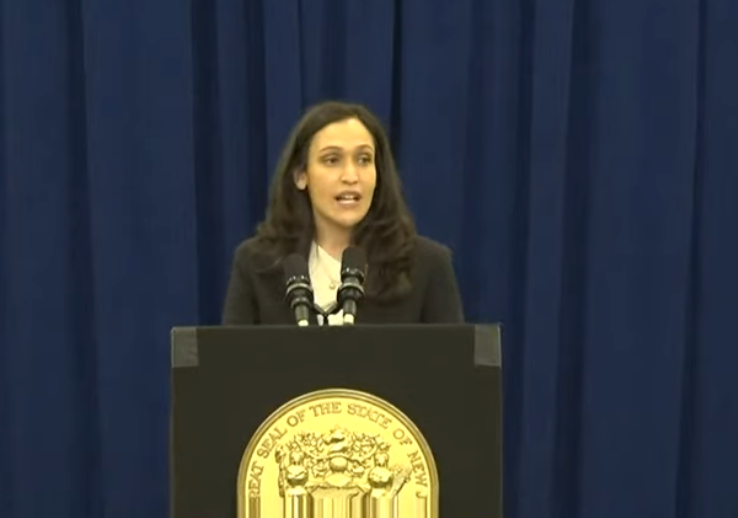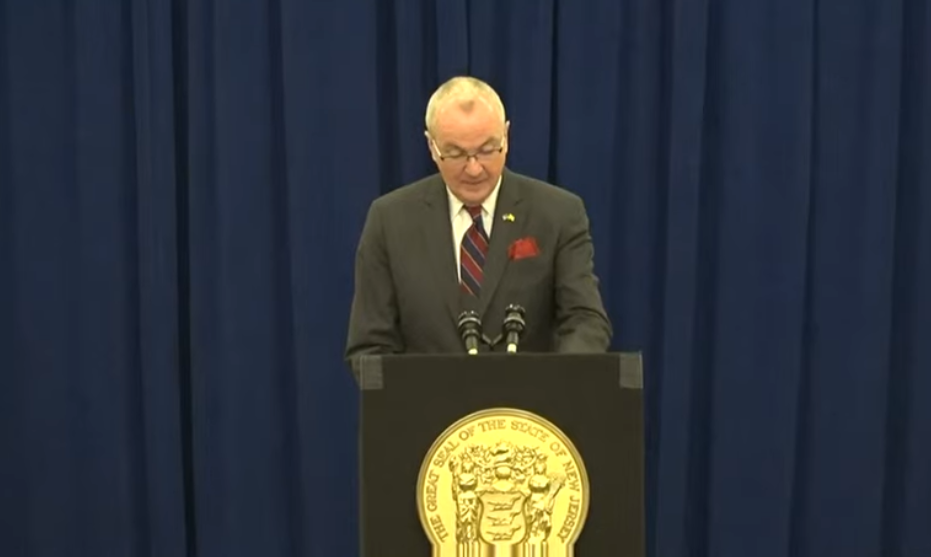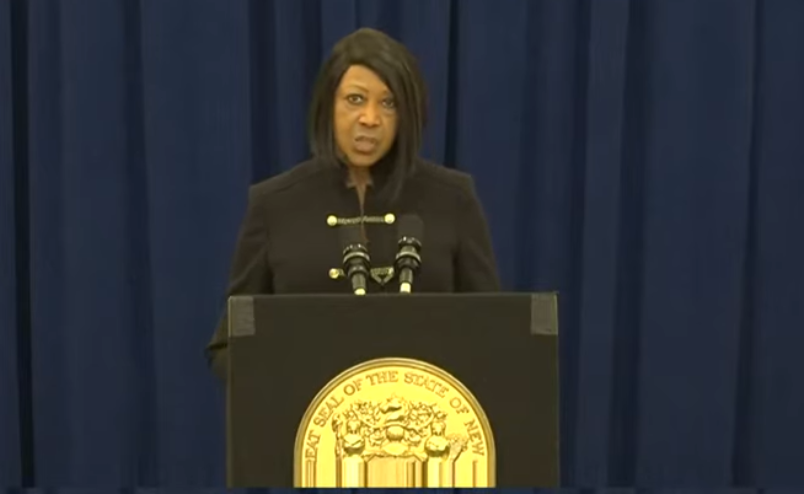Murphy to Nominate Wainer Apter to be an Associate Justice of NJ Supreme Court


Governor Phil Murphy this morning nominated Rachel Wainer Apter for the New Jersey Supreme Court to fill the seat of Associate Justice Jaynee LaVecchia, who will retire at the end of the current Court term on August 31, 2021. The appointment will first be sent to the New Jersey State Bar Association’s Judicial and Prosecutorial Appointments Committee. With the Committee’s approval, the Governor will proceed with a formal nomination, subject to advice and consent in the Senate.
“In the wake of Justice Ginsburg’s passing, the advances in civil rights that she spent a lifetime fighting for are under threat in Washington,” said Murphy. “State courts have never mattered more, and I am honored to nominate Rachel Wainer Apter, who clerked for Justice Ginsburg and followed in her footsteps as a civil rights lawyer, to the New Jersey Supreme Court. Over the past few years, Rachel has defended New Jersey’s DREAMers in federal court, drove Facebook to confront hate speech on its platform, and proposed reforms to prevent sexual harassment. I know she will continue to serve all New Jerseyans on our state’s highest court.”
“Rachel has dedicated her professional life to protecting others from grave threats to their liberties,” said Lieutenant Governor Oliver. “Our Court has stood, time and again, as the last best protector of the rights of residents. This court has stood strong against outside political interference and pressure. Rachel will undoubtedly continue and strengthen this storied tradition.”
“Rachel is an intellectual powerhouse and one of the country’s most thoughtful and passionate civil rights litigators,” said Attorney General Grewal. “She was one of the first people I brought on to my leadership team as Attorney General and since then I’ve had the privilege of working with her to improve the lives of all New Jerseyans. During her tenure as Director of the Division on Civil Rights, she transformed the organization into a national leader and innovator. Rachel will no doubt serve in the finest traditions of our state’s high court, where she will continue to use her many talents to ensure equal justice under law. I applaud Governor Murphy for this extraordinary nomination.”
“I know Rachel Wainer Apter through her work as Law Director of the New Jersey Division of Civil Rights. She has an outstanding educational background and is a highly accomplished civil rights lawyer,” said Senate Majority Leader Loretta Weinberg. “Having begun her career as a law clerk for justice Ruth Bader Ginsburg, I know her career has been dedicated to a fight for equality. The Governor has made a fine nomination and I look forward to meeting with her very soon.“

“The law is not simply a subject to be debated or a puzzle to be solved, but something that profoundly impacts the lives of individual people each day,” said Rachel Wainer Apter, Director of the Division of Civil Rights. “The cases that the New Jersey Supreme Court hears concern issues of fundamental importance to our state and to all of us as individuals, including how our society will live up to the promise of equal justice under the law. I am grateful beyond measure for the faith that Governor Murphy has placed in me with this nomination, and will do my best to serve the people of New Jersey if confirmed.”
Wainer Apter currently serves as Director of the New Jersey Division on Civil Rights – the state agency charged with protecting the civil rights of all New Jerseyans. The Division is responsible for enforcing the New Jersey Law Against Discrimination, the nation’s oldest anti-discrimination law, which prohibits discrimination on the basis of race, creed, color, national origin, ancestry, sex, age, marital status, sexual orientation, gender identity, disability, pregnancy or breastfeeding, and a variety of other protected characteristics in the workforce, places of public accommodation, housing, and lending. The Division is also charged with preventing and eliminating discrimination in New Jersey by both receiving, investigating and acting upon complaints alleging discrimination, and by affirmatively issuing reports and publications, conducting investigations, and implementing educational and community outreach programs to address systemic discrimination.
Prior to her current role, Wainer Apter served as Counsel to the Attorney General, advising on civil rights and immigration matters, including leading the New Jersey team that defeated a motion by Texas and seven other states to end Deferred Action for Childhood Arrivals (DACA).
Prior to joining the Attorney General’s Office, Wainer Apter worked at the American Civil Liberties Union on cases concerning voting rights, reproductive freedom, and the right to be free from discrimination. She served as counsel in Masterpiece Cakeshop v. Colorado Civil Rights Commission, which considered whether a baker who refused to sell a wedding cake to a same-sex couple was exempt from Colorado’s anti-discrimination law. Wainer Apter also argued and won a disability discrimination appeal in the United States Court of Appeals for the Second Circuit and led a task force regarding investigations into incidents of sexual harassment and sexual assault on college campuses.
After law school, Wainer Apter served as a law clerk for Justice Ruth Bader Ginsburg on the United States Supreme Court, Judge Robert Katzmann on the United States Court of Appeals for the Second Circuit, and Judge Jed Rakoff on the United States District Court for the Southern District of New York. She also worked in the Supreme Court and Appellate practice at Orrick, Herrington and Sutcliffe, where she served as lead associate or lead attorney on dozens of cases in the United States Supreme Court and federal and state courts of appeal, including three Supreme Court merits cases, a successful petition for certiorari, and a successful petition for en banc rehearing.
Wainer Apter graduated from the University of Pennsylvania, summa cum laude, and received her law degree from Harvard Law School, magna cum laude. A native of Rockaway, New Jersey, Rachel lives in Englewood with her husband Jonathan and three children.

Wainer Apter’s remarks, as prepared for delivery:
Thank you Governor Murphy and Lieutenant Governor Oliver for those very kind words. I am grateful beyond measure for the faith you have placed in me with this nomination.
Serving on the NJ Supreme Court is the most important trust that can be placed in a lawyer in this state. The cases that the Supreme Court hears concern issues of fundamental importance to the state and to all of us as individuals, including how our society will live up to the promise of equal justice under the law.
The New Jersey Supreme Court also has a distinguished tradition of independence, fairness, and integrity. I would be honored to be able to continue that tradition.
Thank you also to the Governor’s Chief Counsel and Chief of Staff, and to Chief Justice Zazzali and the entire Judiciary Advisory Panel, who all took such care in meeting with me.
I am looking forward to meeting with the State Bar Judicial and Prosecutorial Appointments Committee as well as Senate President Sweeney, Senate Judiciary Committee Chairman Scutari, and the entire Senate as part of the confirmation process.
My great grandparents fled anti-Semitic persecution in Russia and Eastern Europe and came to the United States in search of freedom. As a child, I was tremendously impacted by learning about the Holocaust—I went through years of grade school reading only books about the Holocaust, and had vivid dreams that I was living during that time.
That gave me a strong sense of how fortunate I was to live in this time and place, but it also impressed upon me the horrors that can come from dehumanization, when one person deems another person as “other” or denies their humanity.
I therefore always knew I wanted to help people, and in law school I realized that meant civil rights law: the idea that all people are entitled to equal justice under the law, and to be treated with equal dignity and equal respect.
We now think of this concept as an integral part of our federal constitution, but at the time the constitution was written in 1787, many people were left out of the “We the People of the United States” referenced in the opening words. People brought to this country as slaves and all of their descendants. Native American peoples. Women.
The past 234 years have largely been a struggle for those who were excluded at the time of the Constitution’s drafting, and who have been excluded in the many years since, for full and equitable inclusion in our national life.
And I was very lucky after law school to clerk for 3 judges who played a part in that struggle: Judge Jed Rakoff, who just wrote a book about flaws in the justice system; Judge Robert Katzmann, who, while serving as a judge, founded a fellowship that trains lawyers to represent immigrants facing deportation or pursuing lawful status and citizenship; and Justice Ruth Bader Ginsburg, who, before she ever became a judge or a Justice was largely responsible for convincing nine male Supreme Court justices to enshrine equal citizenship for women into the United States Constitution.
Today I want to briefly discuss two values that I both admired about and shared with Justice Ginsburg. The first is a central belief in the equality and dignity of all people—that everyone should be able to dream, to achieve, and to set the course of their own lives without barriers based on race, religion, nationality or ethnicity, gender identity, sexual orientation, or disability.
The second is a belief in the importance of the law not simply as a subject to be debated, but as something that profoundly impacts the lives of individual people each day.
A large part of my professional career has focused on addressing systemic inequality. At the ACLU I worked on major civil rights and constitutional cases to defend anti-discrimination laws, protect the right to vote, and safeguard the constitutional rights of people accused of crimes. While counsel to the Attorney General I worked with stakeholders to draft the Immigrant Trust Directive, which curtails the involvement of New Jersey law enforcement officers in federal civil immigration enforcement. And at the Division on Civil Rights I have worked to broaden the New Jersey Law Against Discrimination, combat sexual harassment and the rise in hate and bias, and tackle systemic racism.
But I have never focused only on laws or systems—instead, I have always centered the individual lives that laws and systems are meant to serve but can so often harm. For example, when I traveled to Texas to defend DACA on behalf of the State of New Jersey, I spoke not only about the legal intricacies of the case—but also about one individual DACA grantee who testified that without DACA, her life would change in ways big and small: she would lose her job, but also be unable to do everyday things people take for granted, including drive, purchase cold medicine at a pharmacy, and enter a public building.
The New Jersey Supreme Court has a proud history of recognizing the equal dignity of every human being and acknowledging how the law impacts real people each day. Justice Ginsburg shared that legacy. I hope to be able to live up to that promise.
I want to thank the Attorney General and my incredible DCR family for their efforts every single day to protect the civil rights of New Jersey residents.
I want to thank my spouse, Jon, who has been my biggest booster in all ways and who has made my career possible by valuing it as much as his own, and my children, Eliana, Maya, and Noam, who make me laugh every day.
I want to thank my brothers, Josh, Seth, and Zack, and their families, and my parent-in-laws, Elaine and Naftali, for their constant love and support.
And finally, I want to thank my parents, Mitch and Suzi, who guided me to use my skills and abilities to better the world.
Thank you again, Governor Murphy, for this tremendous honor. I am truly humbled, and I will do my best to serve the people of New Jersey.








Leave a Reply